MIA 3: VEVRAA
The 3rd MIA meeting, on September 5, 2024, was focused on veteran employment protections.
-
This is our third conversation I'm gonna mute y'all um all right bye um the there's our third meeting the first one was kind of an overview second one was hate crimes where we got some good things going on I got a call from Tim uh earlier Eric uh and this one is going to be on employment and employment discrimination how it intersects with military folks um so just like last time we'll do 20 minutes 20 minutes 20 minutes there's not very many of us so leave lots of time for discussion um but the the bulk of it I'm going to be talking about um VRA usera is actually pretty good law seems to work um doesn't protect veterans it protects service members anybody was an active contract um and then going to talk about some of the the examples or evidence of how we can see when things aren't quite working so I said rampant discrimination but I don't know is the first word that came to mind and then we'll talk uh we'll have our our discussion at the end um
um so the close this out I cannot introductions uh Tim I don't remember if you were there but uh Eric and Tim if you let me know if you've had any experience or anecdotal interactions around employment discrimination harassment or bias um and then I'll I'll kind of close this out with with my own experience and we'll get started um from the standpoint of a um of a case worker I have handle cases that they that have dealt with that uh where a person that worked for an agency was not receiving the um benefits that they were supposed to based off being or the consideration they were supposed to get based off of being a veteran um in that regard it was um um um you're supposed to get a special consideration being a veteran and he wasn't getting that special consideration um then uh there was another one where uh he was being placed because of he was a veteran based off being a veteran he had a specific kind of disability and they were putting him into a role based off of not considering his disability with the hopes that they could fire him later um and which can't happen that was totally they weren't supposed to be doing that so I fact those those are two that come to mind but if I went through I've probably had five or six cases of that
nature Tim you have any input or thoughts or well Mine mine's a little older um I served from 84 to 87 we were still in the shadow of Vietnam um I was an Army medic and when I came back here I also got my Maryland State EMT I was stationed at Fort me Maryland I worked on the post ambulance uh fort fort me Maryland uh I came out with a letter of recommendation Etc and when I came out to California of course there's no reciprocity at that time um but what I ran into um was just a lot of we don't care about your military experience we don't care that you were in the army um we don't you know just a whole bunch of of that and again um this was still we were in like I say the shadow of Vietnam um things didn't change until start changing until Desert Shield Desert Storm and then of course it uh with 911 it it blew up um but yeah there there were things like that it it wasn't unusual shall I say okay Nick uh I see you just joined us we're just talking about any experiences we've had as veterans or experiences we've heard of that um that might give us some insight into employment discrimination or bias did you have anything you wanted to contribute I see that you're muted
though hello um just checking in at the moment don't have any thing to say at the moment but just checking in okay awesome thanks Nick um as promised um so this is what set it off for me is employment discrimination just as quickly as I can make it I was on track to be an academic I just wanted to teach at some sleepy college town and read books and think about God and uh I had my first master's degree uh uh from duke um it's a really interesting experience I went there wanting to study something and I didn't get the chance to because there was a clear need to be thinking about something else and I was constantly being sought out for advice by shared faculty members about how to understand and interact with veterans because I was older than most of the students and I'd kind of been through the ringer um I got a second degree and came back and uh I got a a TA contract and I mean it's an atwi State it's you know that's all fine in Dandy um but I had several years of teaching experience before I began working at Duke as an employee and something clicked for me when I found out I was going to become a dad and um a lot of the like thousand tiny paper cuts I'm sure many of most of y'all can kind of uh can affirm like you can take it like that's what I was trained to do uh you know when I when my back first went out when I was 31 my now wife had to like tell me Logan this isn't normal let's go to the emergency room so we went to the VA and she saw how much it sucked and then she was like Oh I thought you were always just overplaying how bad it is I'm like no it really sucks um but when I when I found out I'd become a father um it wasn't just another consenting adult that I had responsibilities for it was a a soon to be born child so how it played out for me was I got this weird ta section I was given an evening section which we never had before uh at Duke and I was given half the number of students as all the other preceptors and some of the other Tas we call them preceptors some of them had two section so it made sense to me like why would why why wouldn't you just make sure all the sections have equal numbers then I thought well you know nobody wants to work at night and so I asked my students like you know on the first day of class I'm like what appeals to you for uh for night class and most of them said I didn't choose this they just put me here so that was all fine um but then I found out I was going to be a dad and the timing of the section was at when I would be doing bedtime and so I didn't want to talk to the person who hired me because she had a a history with my wife and I just didn't like her either she just I just didn't trust her and so I did what I thought I was supposed to do you find the EEOC representative that was the Divinity Dean at the time so I I set up a meeting with the Divinity School Dean uh just to say look I want to keep working here but I can't work in evening section and the person who hired me we have a history of and I don't think she would treat me fairly so I had this meeting then I got an email saying hey everybody's got to do this implicit bias training it happened to be on the same day I was supposed to meet with my Dean February 29th 2016 and so I go to this implicit bias training in my mind knowing I'm about to talk to the dean about like how do I keep working here without you know getting replaced as a squeaky week and it was in that implicit bias training where I realized all the stuff that I just kind of was shrugging off as a student and was seeing as an employee as well that the name for that or you know I was I was just kind of shrugging it off because it just must suck to be a veteran like I get it and I realized like no that's not supposed to be how it works this is what by you know uh anti-bias stuff is for you know so that you're not looked at in class as though you've got one veteran told me he said sometimes the other students look at me like I've got stupid stamped across my forehead and all they know about me is that i' served and I deployed so um I met with my Dean it was a really good conversation and it's very kind of candid and up front I wasn't had no reason to be like Angry it was just like I I need to take my career path seriously because I have no mentors there were no military veterans on faculty at Duke at my school I had nobody who was walking me through how to be a seminarian or uh a religion scholar and I had somebody who had control over my job that I didn't trust and could use my military service as an excuse to take away a contract so um the dean encouraged me to talk to another vet the only vet she knew at the Divinity School who happened to be a fundraiser and who had had been a commander in the Navy I don't know how high he was I think it was like an ' 06 and this other vet as a fundraiser you know you got to make people happy you're all you always got a smile on your face and I told them all this stuff that had gone on when I was a student including learning that a student veteran had taken their own life two years before I had gotten there and what Duke senior vice presidents were saying they were going to do to change orientation and change the culture at Duke because of this suicide by the time I gotten there in 2010 still didn't happen um and the veteran this guy um it was it was not his experience he was he had a really good experience at Duke he loved his job he loved his peers he also wasn't enlisted and uh he was in a combat MOS so there were these tiny little distinctions that I began seeing as like oh these are bigger than I realized and at the end of our meeting I said I had this kind of litany of things that I and other veterans had brought up when I was a student and the the president of the SVA chapter at Duke um and at the end of the meeting I said you know I just want to help I want this place to be a better place for other veterans I'm I'm already working here like um and he said something to which my response was like I'm tired and angry and he didn't and I said something like you know if if after hearing all this stuff you aren't angry too like I don't know what we are gonna do because we're not gonna nothing's going to change and so he then tried to take stuff into his own hands um and things just kind of fell apart the person who hired me found out I was asking questions I didn't get offered a second contract I blew the whistle the wagon circled and inside six months I started two Federal investigations at Duke and I was basically I'd been told by one of my faculty mentors you'll be blacklisted if you pursue this sure enough I was a stay-at home dad from next eight years so this is really close to my experience it's very complicated another veteran in California who's a practicing attorney the way that vevra is written um well I'll talk about usera really quickly usera is a law that seems to be working the United Services and employment and re-employment Rights Act was passed in 1994 title 38 section 4301 and onward um it protects the civilian employment of active and Reserve Personnel when they are activated and also clarifies existing law improved enforcement mechanisms and added federal employees uh as being eligible to receive protection under usera um and to this day that's it's it's certainly not perfect but there are several cases of usera actions that have benefited veterans um I see your hand has raised him just one moment um I I forgot to put in the Amendments well I wanted to make sure that I know usera exists with GI Justice and Mia I'm focusing on the laws that we need that we that are poorly written don't exist or aren't enforced you Sarah I just want to put on the table like I know it's there but it doesn't protect veterans um I think it protects almost all service members if you have a contract uh Tim did you have a comment or a question a comment on on you Sarah and how it does not work I had a friend of mine I served with Mark ji he was staff sergeant biomedical equipment repair specialist uh he and I got out about the same time he went into the uh reserve unit in Rena Ohio as a there's a Hos combat support Hospital there as their biomedical equipment repair andco um he was deployed Desert Shield Desert Storm spent best part of a year over there during the whole time um he had a civilian job as a biomedical equipment repair technician with a company that contracted with hospitals he's in Ohio that was where he lived uh when he got back from his service time they said well yeah you can still work for it in Michigan so he had to because someone has your contract that you had before so we will offer you a contract so he had to move his family to Michigan for I think it was about five years until they could move back to Ohio where he and his wife were from so it again it's um yes they reemployed him but not at his previous position and not at his the um previous I believe they call it tier but you know your experience level uh pay thing yeah and yeah that's what it's supposed to protect people from is undo hardship related to your military service um a service member is actually a distinct legal entity in the United States because if you're a service member if you have a contractor an MSO you're subject to the GI uh USM uh good Lord UCMJ first and foremost then everything else after vice versa if someone brings an action against you in court that's why the SC is there it's going to have to wait until you're you you're able to take care of the stuff and this is Eric it goes back to like the Readiness Factor um if you if you know that your employment is going to be changed because you're serving our country that creates an undue hardship and this is what it's supposed to protect against um so vev long name is the Vietnam era veterans Rehabilitation and assistance act initially passed in 1972 um in 1972 it was called maybe just Vera and I have I have a UR I have a his a legislative history of vevra on GI Justice I think it's it's under the blog uh yeah it's under the blog and I think that's the title legislative history of VRA um it wasn't called VRA VRA is the name in 1974 when they added affirmative action you can see I've I've highlighted it here um so there are three there's actually four parts of the law you can see them here the one I've excluded I'll talk really briefly about in a moment and that's about reporting uh but essentially the way the law is written it leaves a lot of things out and I haven't I haven't read this closely in some time but I was about to mention this lawyer in California um Daniel Mendelson he did he did some kind of council work for Disney in California and he discovered or he had suspected that either they weren't doing their Veterans Preference hiring or possibly and I don't remember how he came across VRA but like maybe they were they were in violation and his experience of it is that you know and and he does contract law the actual contract between Disney and the the dod which is I I don't know what it involves I I think it might be licensing Disney material to show overseas or something to that nature um all that the law requires is right here that there's a clause in there that that suggests the contractor will take affirmative action and it goes on it you can uh file complaint and uh the Department of Labor uh will enforce the law or is supposed to even though it's title 38 which is all Veterans Affairs stuff this goes over to labor so there's a weird overlap between do and VA at the federal level that always was confusing for like committees and committee staff members but the only standard they create was prompt investigation I'll get into how that's a problem in a moment um and then finally uh I want to say in the '90s yeah I think it was in the 90s section c was added uh so that the number of complaints the actions and the resolutions would be tracked and reported to Congress and so those three parts I'll talk about individually in a moment um but one of the parts that I excluded from here has to do with eligibility so before we even get into what the law does or doesn't do we're actually excluding including some of the members of this community from this protection so if you think employment discrimination well you can you can discriminate against some of this community but not all of them so in one of the subsections under paragraph a a covered veteran quote unquote has to be disabled they have to have a campaign badge or a service medal and they have to have been separated within three years or I should say or one of these three4 um and there is certainly a Time when you would get a service medal but not a campaign medal if you served during uh the global war in Terror but you didn't uh get deployed you have a service medal but not a campaign medal um but what that does is it creates unprotected veterans vulnerable Veterans for whom it is fully legal to discriminate against them in their employment that includes any peacetime veteran who does not have a disability and it's hard to track the numbers because you know they overlap but when I did some uh uh research in 2016 there were 4.5 million ptime veterans in 2016 um now the way it's worded it just says has a disability and it doesn't specify whether that qualification is under Ada or if in fact they have to be service connected through the veterans benefits and health administration so it's it's vague but that's somewhere between 15 and 20% of the veteran Community it's completely legal and lawful to discriminate against them in employment it's also protects employers if you do not have a contract or if your contract is less than $100,000 a year you do not fall into the jurisdiction of vevra great example here in Oregon at uh Lin Benton Community College last year I put it in uh uh an application to be included in the adjunct pool at twoyear school I've got two master's degrees I'm overqualified but I never got a call back I never I I sent several emails to department heads never heard back so I contacted the state Bureau of Labor and Industry and they said you should probably file a complaint it sounds like they're in violation of the state level Veterans Preference stuff now I also asked because I always want to know what bases I can run I tried to find out if in fact LBCC was a federal contractor they weren't sure I talked to HR I can't remember their name HR didn't know they had to actually ask their councel whether or not they're contractors and I double checked they are not federal contractors I am not protected by vevra at LBCC so that's an example they they uh so there's a a a database that lists all the federal contractors how much money they get each year their address Etc and there's some contracts that are like five or $6,000 and they're big you know they're big manufactur facturers there's one like a cement company out here does a lot of business with the Department of State or something or no agriculture that's a federal contract but if it's less than 100,000 those employees at that cement factory would not be protected under vev um so moving into the kind of meat and potatoes of the act vevra as you saw in section A it talks about affirmative action it really only requires some language and a contract but what does affirmative action look like it's coming under Fire recently the Supreme Court ruled against it in education um I think most Americans are opposed to affirmative action my own understanding of it as you know uh a norm core Sith head you know white guy um is that affirmative action and it came out of 1957 with Eisenhower and Kennedy they talked about taking not just enforcing protecting steps but actually affirmative action to attract to recruit TR uh retain and promote marginalized communities in the interest of diversity in the interest of economic Prosperity Etc in 57 and 1960 we created the EEOC uh it was initially under Eisenhower is called something else Kennedy finally got it in uh in uh the Civil Rights Act 1960 and this is where most affirmative action cases go the employment the Equal Employment and opportunity commission it's been doing its thing for I don't know how long since probably 60 I think before it was this the president's committee on civil rights or something like that um but if you go to the eeoc's website and you look up What complaints what laws what classes and characteristics they protect you'll notice it does not list veteran status or military status EEOC is under no legal obligation to protect veterans I've double checked this I've triple checked this they do not protect veterans uh Housing and Urban Development fair housing and equal opportunity office also does not protect veterans unless it's positively ascribed in law an institution an agency typically is not going to protect military vetan status including EEOC that will come up again later when we talk about when some VRA cases do get enforced and how that's creating a problem um affirmative action is also about creating diversity through um not incentives and I don't I don't even know if it's really enforcement what the hope is is that populations within a workplace represent the relative population outside the workplace place and that's not always the same as population population if anybody knows V you'll know that the Department of Labor establishes what they call a benchmark a hiring Benchmark now in 2020 in Oregon 6.1% of veterans or 6.1% of oregonians are veteran which you can see under column D and this spreadsheet is uh something I recreated based off of this um I don't know if you can see my screen or my my face but the OSU equal opportunity and access office um they've provided this fun little table uh because part of verra requires employers to track who they hire into what tier of employment how many are retained how many are new hires so the data is there and the data is sometimes scary and gross so for example in Oregon 6.1% of residents are veteran the hiring Benchmark is actually 5.7% because it's set at the national level now I drilled into these numbers based off of their own reporting and I have the the last column just is too wide but all the totals so I took the the total number of veterans in the academic tier in the professional tier tier and in the classified tier and I I figured out what percentage of the total academic professional classified employees were veterans and you'll see here academic faculty at OSU there's 1% there's 23 veterans and there's something like 6,000 6,000 total employees I should bring it back or I I could pull it up um at the mid tier so there's there's 2300 academic faculty at OSU 23 of them are veterans that's 1% they're below the hiring Benchmark there are fewer veterans employed at OSU than are qualified probably in the workplace in the mid tier it bumps up to 3.4% representation there's 86 veterans in the mid tier for about 2500 total employees and then finally at the very bottom where you get like maintenance clerical administrative stuff a lot of it is entry level all of a sudden you see we have 3.6% of that tier is made up of veterans so if I'm I've talked to OSU like I want to work there I had a I had a career in Academia before I became a father and after I filed some federal investigations but looking at these numbers it's an uphill battle for me to be recognized for my qualifications and be placed accordingly part of that is because I haven't gotten the PHD but they have plenty of instructors who teach undergrads who assist you know full professors but there's only 1% of representation there at the bottom just because I was curious I looked at how many total employees across tiers and what that percentage of is in their uh 6,300 employees so 2.6 of the entire Workforce is a veteran that means were less than half utilized there should be something like three 320 right there's 164 that is only better than the representation for people with disabilities above that we have Hispanic representation um they're they're less than half as well and an over represented we have Native American and Alaskan Indians which makes sense it's a Pacific Northwest um and the other big one is is um uh people are identifying as Asian so I'm not trying to compare different communities I want to know what their affirmative action plan has accomplish and for me it's not accomplishing much it's it's loading us at the bottom um and so data like this helps us understand that there might be a problem but it doesn't always get us to what the problem is or how to correct it how to get more veterans on campus um and because that's local I wanted to kind of throw that out there as an example the next section I want to talk about is uh promptly investigates uh this is the only standard that is measurable and I say that because vevra has been taken to court a handful of times the highest one uh was Greer V Chow it made it to the eth circuit whoopsies let me see if I can go back I skipped too far ahead um the the law has been challenged or its enforcement has been challenged a number of times most notably by uh Donald Greer in 2007 and I read his stuff he also he filed a couple of other complaints he doesn't strike me as the most reliable narrator um just like you know like Jeffrey Sarver and Blaster one anyway um he's not the greatest guy but like that doesn't make it okay to write bad laws to expose veterans to discrimination um in 2007 reer takes the Secretary of Labor to court saying look they didn't investigate and Sandra de o Conor quoting another vevra Case by a judge uh I can't remember the first name of Kennedy she quoted another case in order to say the investigation like the final decision to enforce is within the agency's discretion and she went on this other judge that she's quoting also said it makes vevra no law at all because promptly investigates is not a meaningful standard uh their their own compliance manual that do calls for resolution within 180 days um my VRA complaint took about 250 the average when I went in foad the last 20 years of data the average was well over a year and a half and I mean they could say it's prompt if they don't have enough staff they don't have enough money that's as prompt as they can go right it's not meaningful standard and so because there's no standard and it wasn't written with the same kind of attention to detail I guess as other laws like Civil Rights Act 1964 we get short trift right um but this is a this is the highest case I can find Donald Greer V Chow Secretary of Labor in in 2007 but I mean it basically means and I wanted to I included her quote because it made me think if the justice department say decided that they didn't want to act on uh racial hatred and bias in employment under this rationale the doj could just decide it's entirely within their realm of discretion to only enforce hate crimes against white people or something I don't know I was really struck that a former Supreme Court justice has said they they can do whatever they want they can piss in a bucket and call it lemonade because that that's what they can do and as we'll see in a moment that is kind of what's going on finally this complaints paragraph uh it just says you can complain and a Secretary of Labor has to investigate and then it talks about you know the some of the definitions and stuff so I looked up I started you know I'm a state- home Dad I got plenty of time a lot of stuff I can do on my phone and so a couple of years ago I looked up how many complaints were being processed by do and remember I saw that the law is clear number uh actions and resolution right three things and when I first saw in 2018 was just that what you see on the screen one line containing the number of complaints 132 I was like okay well that doesn't seem right uh there at least needs to be some more information I checked 2019 that is the only line they had in 2019 this annual report 179 complaints now one thing to know is that the enforcement agency is not the reporting agency underneath do are two agencies one the enforcement agency is the office of federal contracts and compliance program they enforce or they I'll use the scare quotes enforce vets veterans employment and training services they do the report and vets and ofccp don't always talk and when I foed I foed ofc CP and do even has a page on their own website of the enforcement data that does not match any of this and I'll I'll show it I'll show it in a second and I'm laughing because I don't want to cry or throw my computer across the room 2019 I was like wait a minute you guys got to get your [ __ ] together I I talked to a guy named Robert Shepard and then I talked with his boss torren something torren I think torren is still there and I I let them have it I I brought the receipts I showed them the PDF on their own website I showed them the law I linked it to.gov you know whatever and they tried to Gaslight me they tried to ignore me and then I went to Mike Levan who at the time was uh on the subcommittee or he was on HVAC um and I was in his district when I was living in California the year before last and I made a big stink and 2020 don't you know all of a sudden they magically publish this table and it has all these complaint outcomes there's the first time it appeared uh maybe since the the reporting requirement was written in July I don't know and it has here a total of 194 complaints and so it's gone up but when you start looking at their own information it leaves a lot of questions so in 2020 most of their complaints 40% of them were either closed without without stating why or they referred to the EEOC which we all know does not protect veterans so 80% of their own complaints they're saying we brushed them off to another agency or we're not going to tell you why we closed them that feels suspicious to me so I kept pressing them in 2021 um nothing appeared I don't know why it was just crickets there was no line there was no table there was nothing and that's that's when I kind of U the pressure on Levan um and Bobby Scott I think was the do or he was the labor committee chairman at the time and he was a veteran still I never heard back from his office 2021 there was nothing 2022 they have this table and now the number's gone down to 10 complaints uh that's how many they closed and of those they oh they referred again 40% to the EEOC which is an agency that does not protect veterans um 42 of them they said it wasn't their jurisdiction and then two of them they provided a right to sue which is essentially we're not going to help you but you can sue them if you do it within I think it's 90 days or I don't know there's some limit but they according to this they did not have a single finding of Merit in 2022 there was not a single complaint from a veteran that was legitimate in their eyes fast forward to 2023 the most recent one I just saw this stuff last night because I had to get the screenshots they received 400 complaints that's an increase of almost
400% then of I guess they all they received 414 but they only investigated 20 I think they closed with no violations the vast majority of them two of them they found violations in 2023 and that again statistically that's not that's that is statistically significant that's saying 80% of the veterans that they invest the claims that they investigated based on a veterans complaint were without Merit they're all just a bunch of malingerers pro profile Queens broke dicks I don't really believe that but I'm not sure what those numbers say other than we don't believe veterans yeah go ahead
Eric is there any way to find out those two uh that were um verified what they were for and uh the other ones is it possible to get that kind of data like what did they turn say wasn't or what did they say was the Foya is the most reliable I'm going to try and open so I didn't include my I'm a little crazy uh I Foya 20 years of data and sorted it into you know vets not vets let me see if I can find it um yeah here it is let me see if I'm sharing this no no no stop sharing okay share another thingy is that it yeah I think that's it okay so yall see in a Google sheet yep so this is600 cases between 2000 and 2020 actually yeah this is it so I foyer it um and none of the numbers that I've just quoted to you that are being reported to Congress I could not match any of them up because each year there was yeah I I even had some charts and I Eric I can share this with you if you want it's been a while since I've really refined it but like data's data is just data but the stories that data tell us is important so one of the charts that I'll show you again here in this 20 year that that's different I've updated these guys here from 2000 to 2020 ofccp Do's enforcement agency received more complaints from veterans than any other complaintant that they protect in at same time veterans and VRA received the fewest findings of Merit so we are the largest group of complainants to the do and the do is coming back to us saying disproportionately we don't believe you that I don't know you're making this up or maybe they're smart and they say and they look into it and they're like look there's no law that has been violated bevra is not that kind of law um and there's nothing we can do because you know what are we going to do tell them that they did something wrong when there's nothing in law so to your question Eric yes there's a way I can foyer this stuff or I can look up on the data enforcement enforcement data page to see in 2023 how many V complaints there were of those how many were by veterans because it it doesn't always overlap for some reason and then it will have the respondent's name the the person the uh the the defendant essentially so we can get that data it wouldn't be much time and that's one of my like pet projects was to um to look that stuff up and try and you know kind of report it out as though I were a little journalist or something I'm I'm not I don't have any training but like I know how stories work and I know how to ask people what's going on um but here's the up ated data with a link to the actual Foya data set um they've anytime they get foas they store it and I imagine mine is one of them but that was this is what my data that I got from Foya suggests and everything they're reporting to Congress is convoluted and unverifiable at least as far as I can tell um and so that kind of leaves us in this position of like it's a crappy law an agency is not even enfor forcing the crappy law and it's something that uh one of the things that is troubling is that I found some reports that suggest peacetime non-disabled veterans are at greater risk of unemployment and yet they're excluded from employment discrimination protections so at the very top we have to rewrite vevra we have to start from the the bottom or the the from scratch and create clear enforcement standards remove eligibility requirements just like removing the sunsetting of hate crimes after what is it 5 years after discharge or separation the labor department needs to abide by the 14th Amendment and provide equal protection they need to do a better job of investigating um and then also track and report that data accurately to Congress and make it a matter of public concern I've asked repeatedly uh Levan and Tron Tron was on labor for a while um look have a hearing get it on C-Span so at least it makes it forces the the conversation to the to the four but I I couldn't succeed because it always happened that the person I was in touch with their party was losing power something something um and then finally state and local they frequently have their own like Oregon has from all I can tell a decent uh Veterans Preference but they're not being it's not being enforced I mean the example I used earlier um they they're they wouldn't give me just a verbal a verbal affirmation that they followed the process because I could prove to them that they were being honest or not if they made any hires in the entire year that my application was active they would have been required to interview me if they made a single hire of an adjunct faculty they would have been in violation because any anytime you hire you're supposed to also at least interview a veteran Under Oregon state law um and so typically state enforcement measures and state protections are better it doesn't mean they're more enforced or more well known but I think that those are the kind of challenges that we face in our next steps um that went longer than I thought I I apologize we have about 10 minutes for uh Q&A and discussion um and as just as before I'm happy to put this on YouTube separately from my own little like thing but um Tim and Nick and Eric if you have anything thoughts questions concerns I'm happy to host a conversation about it
Slides

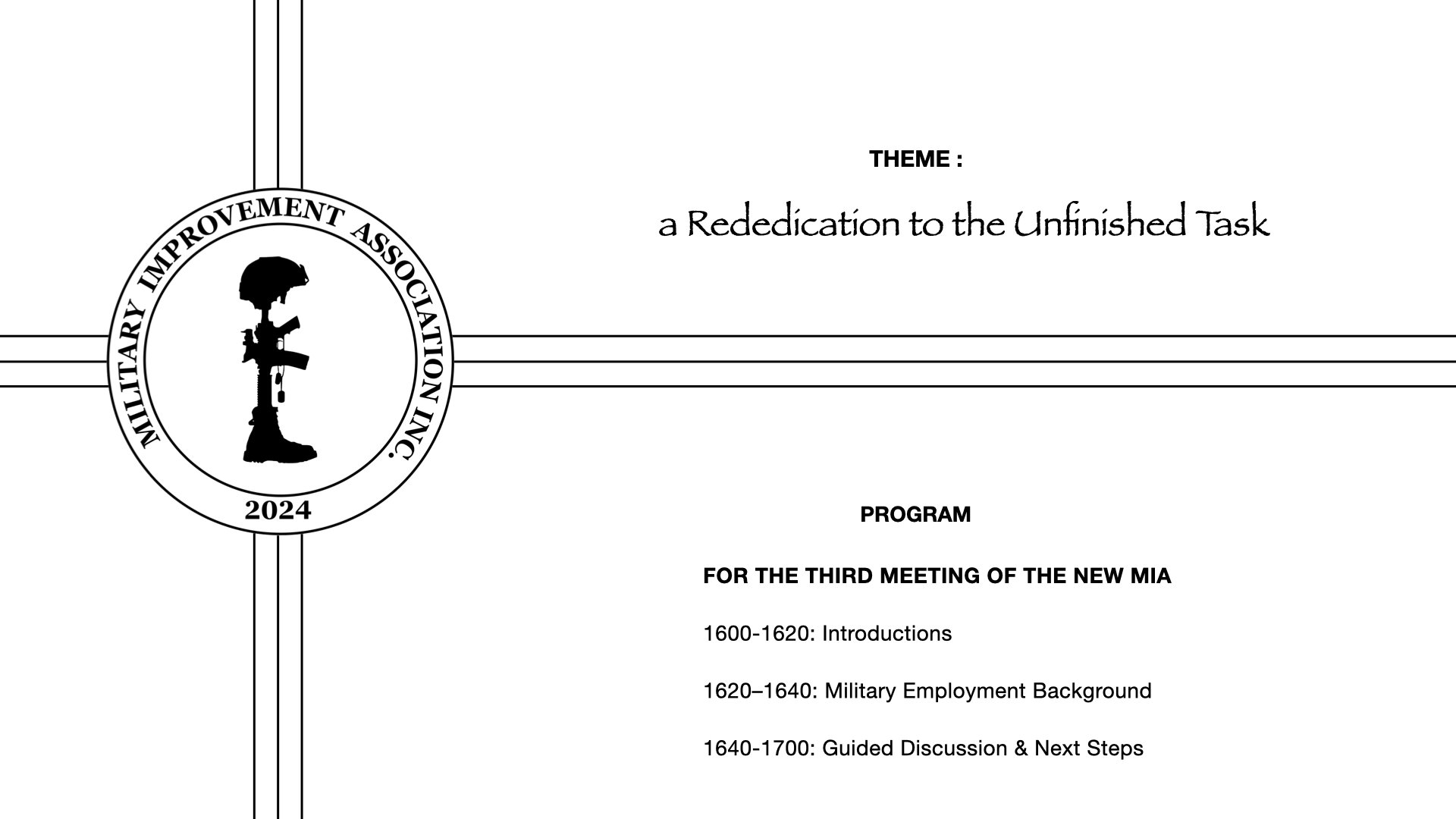
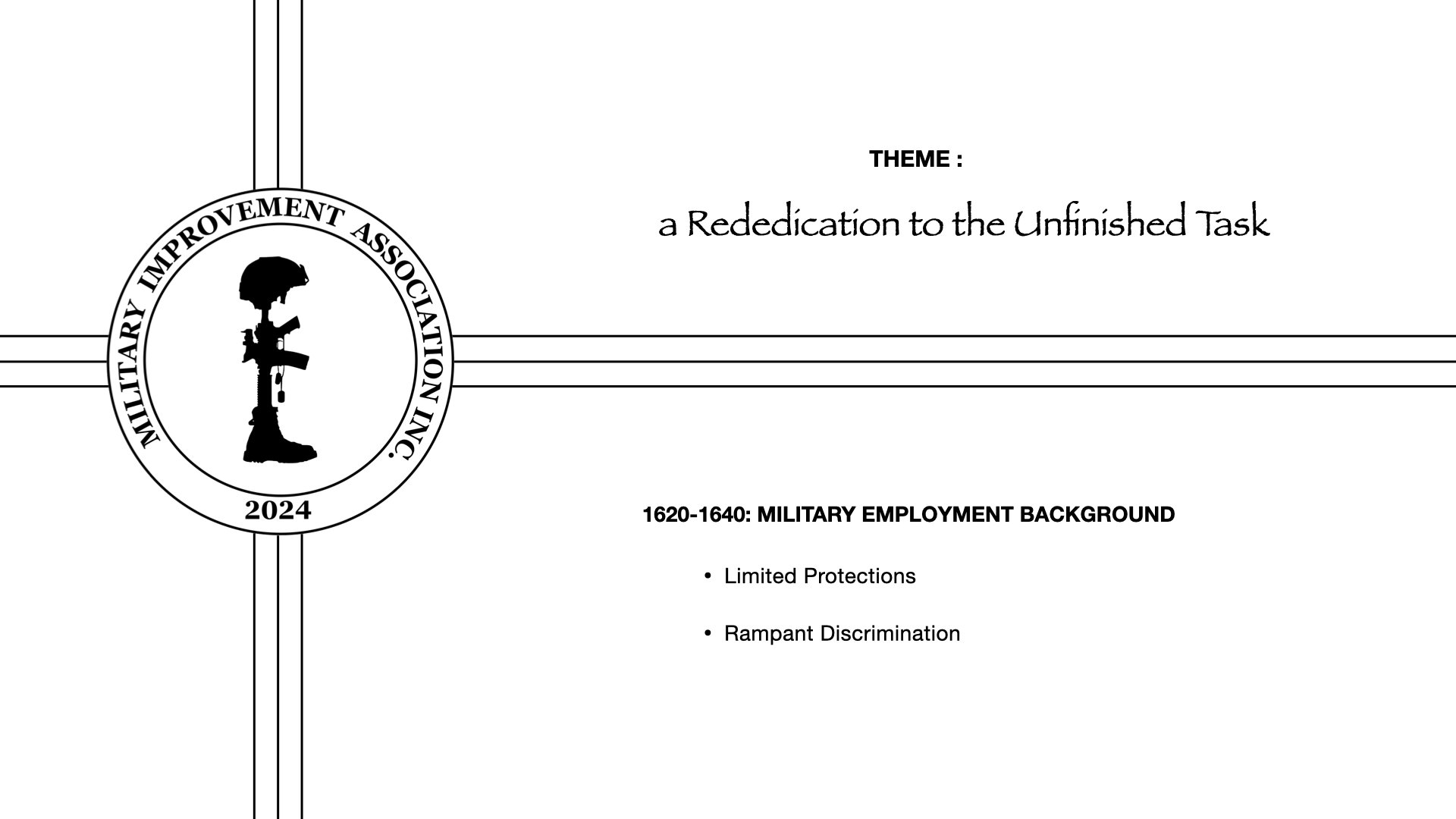
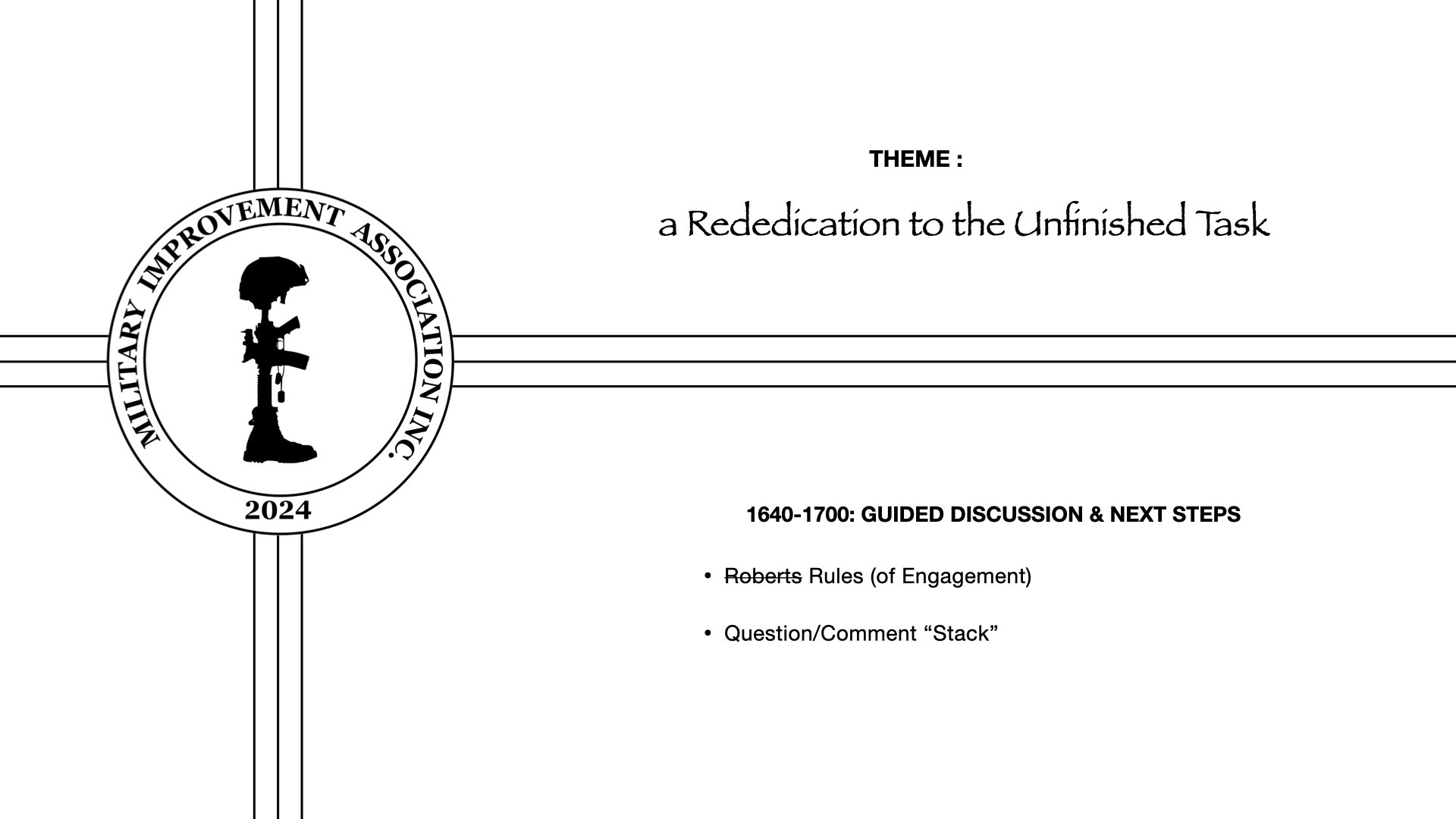
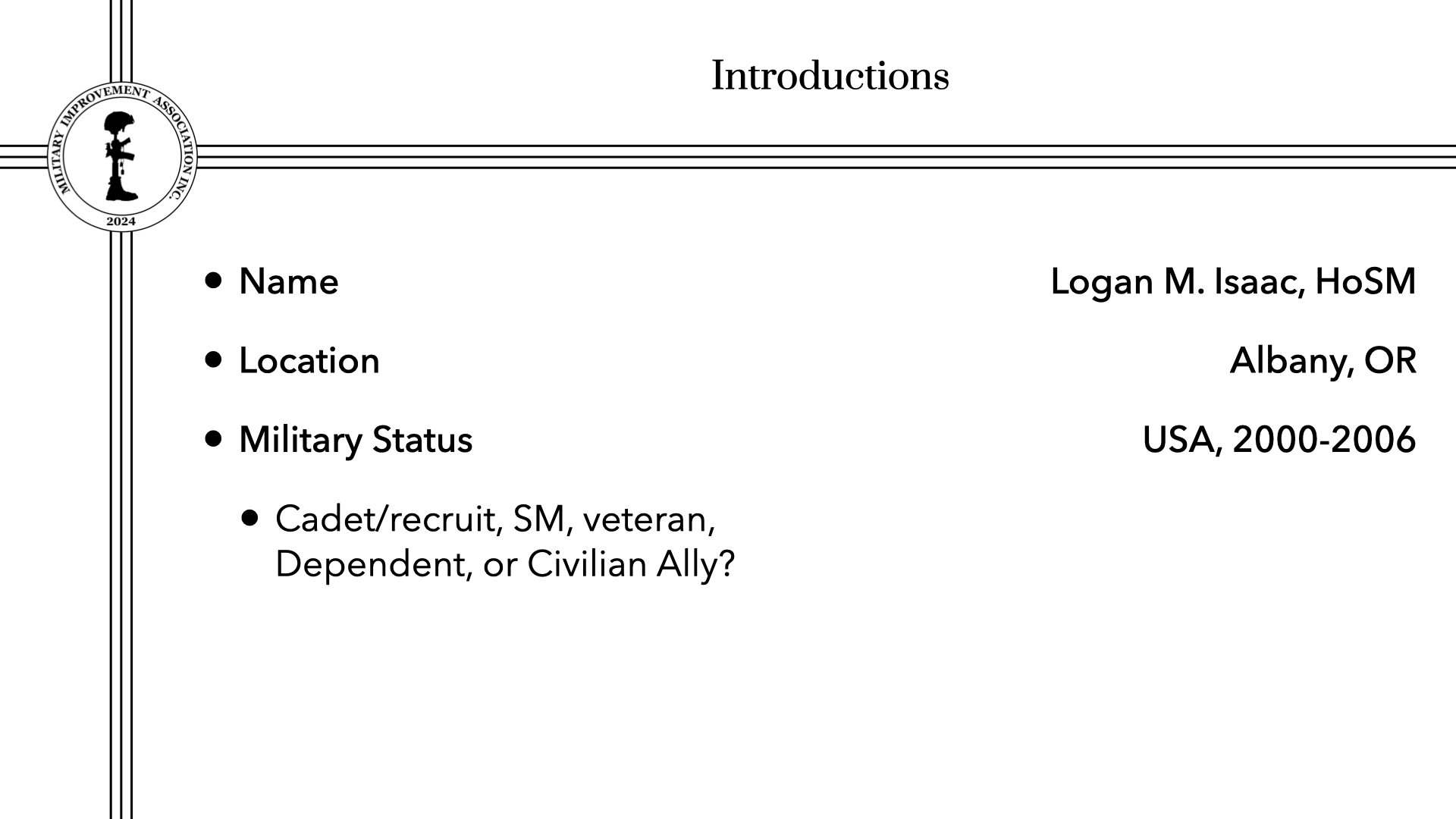
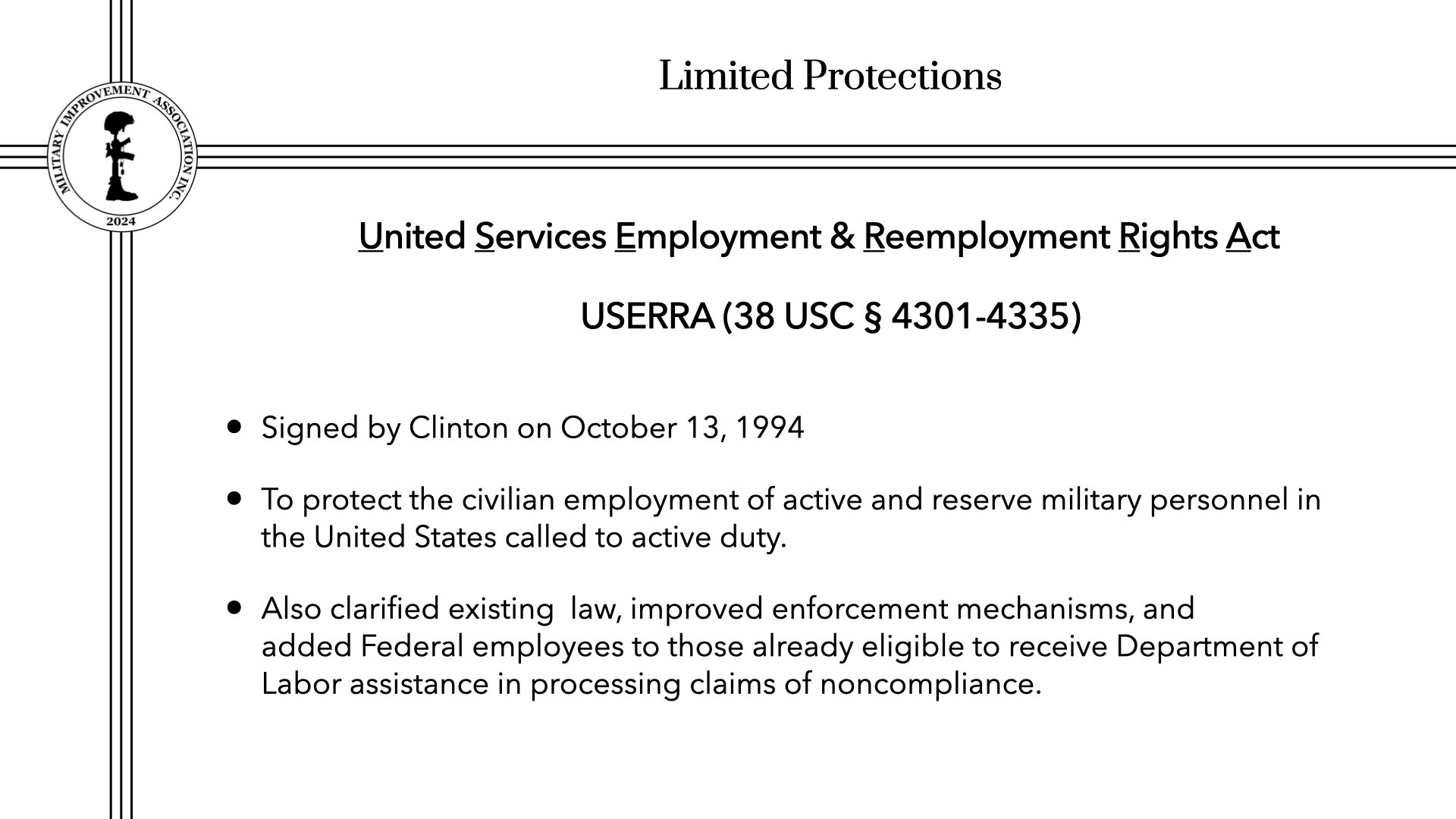
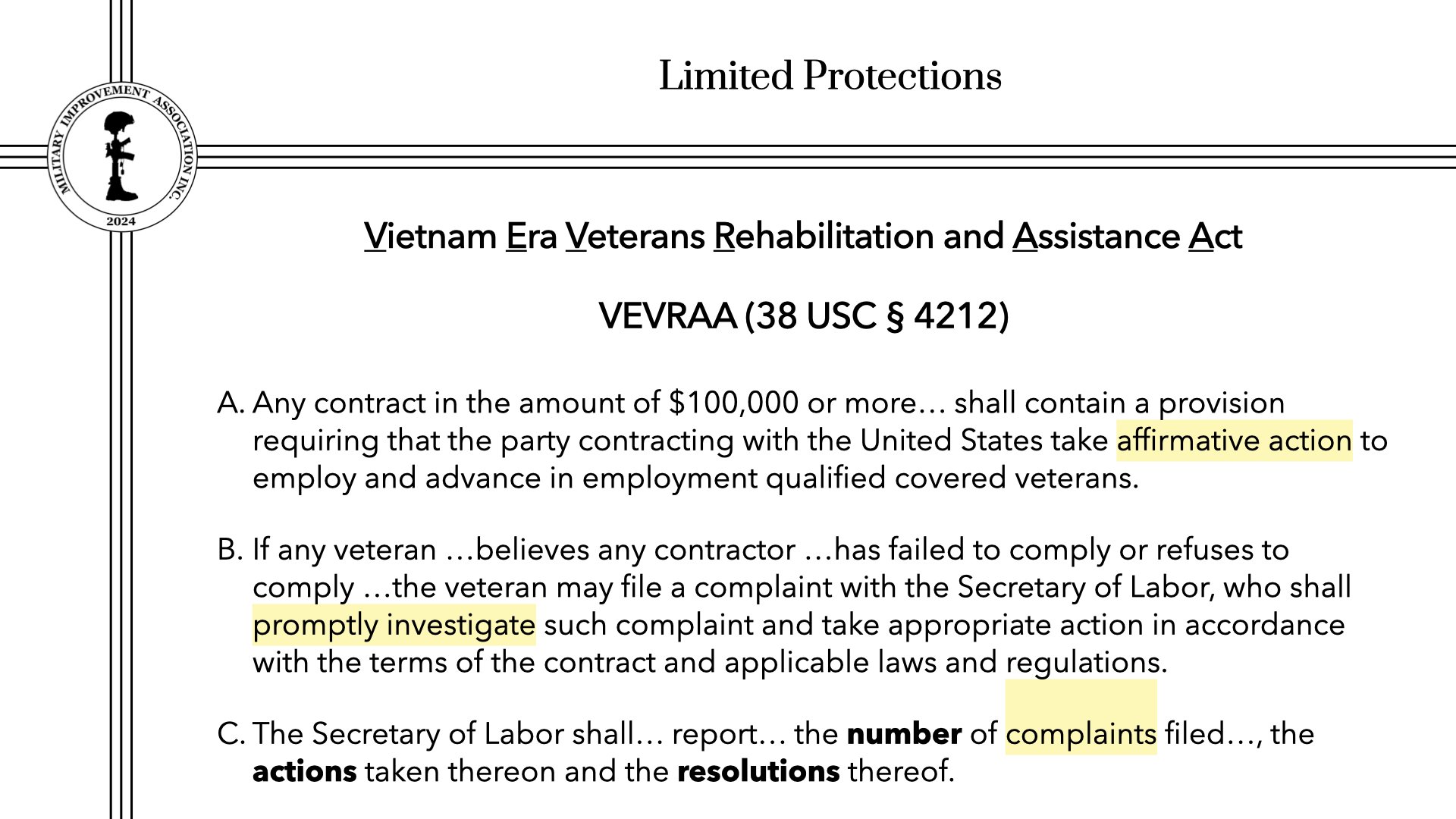
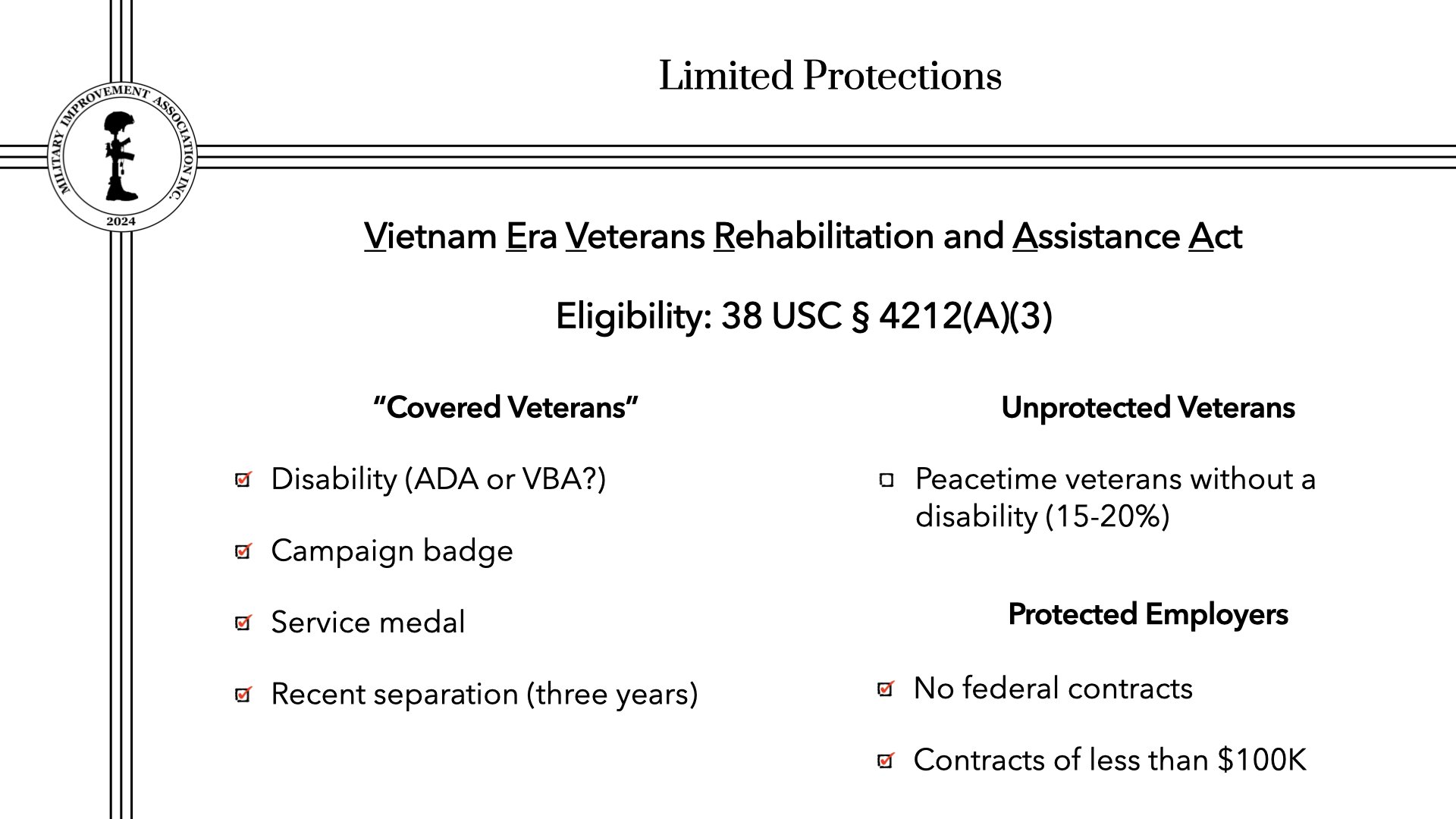
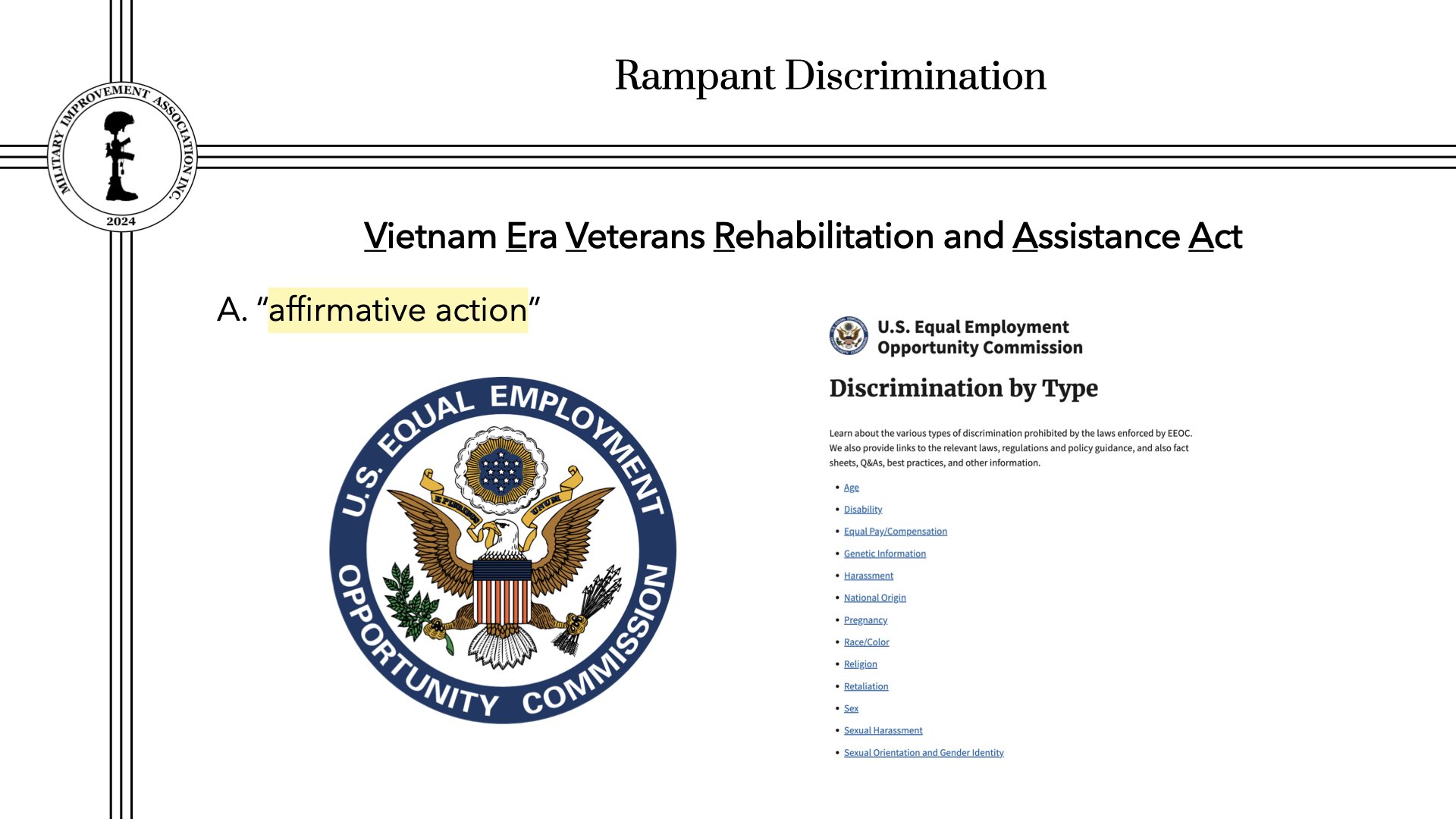
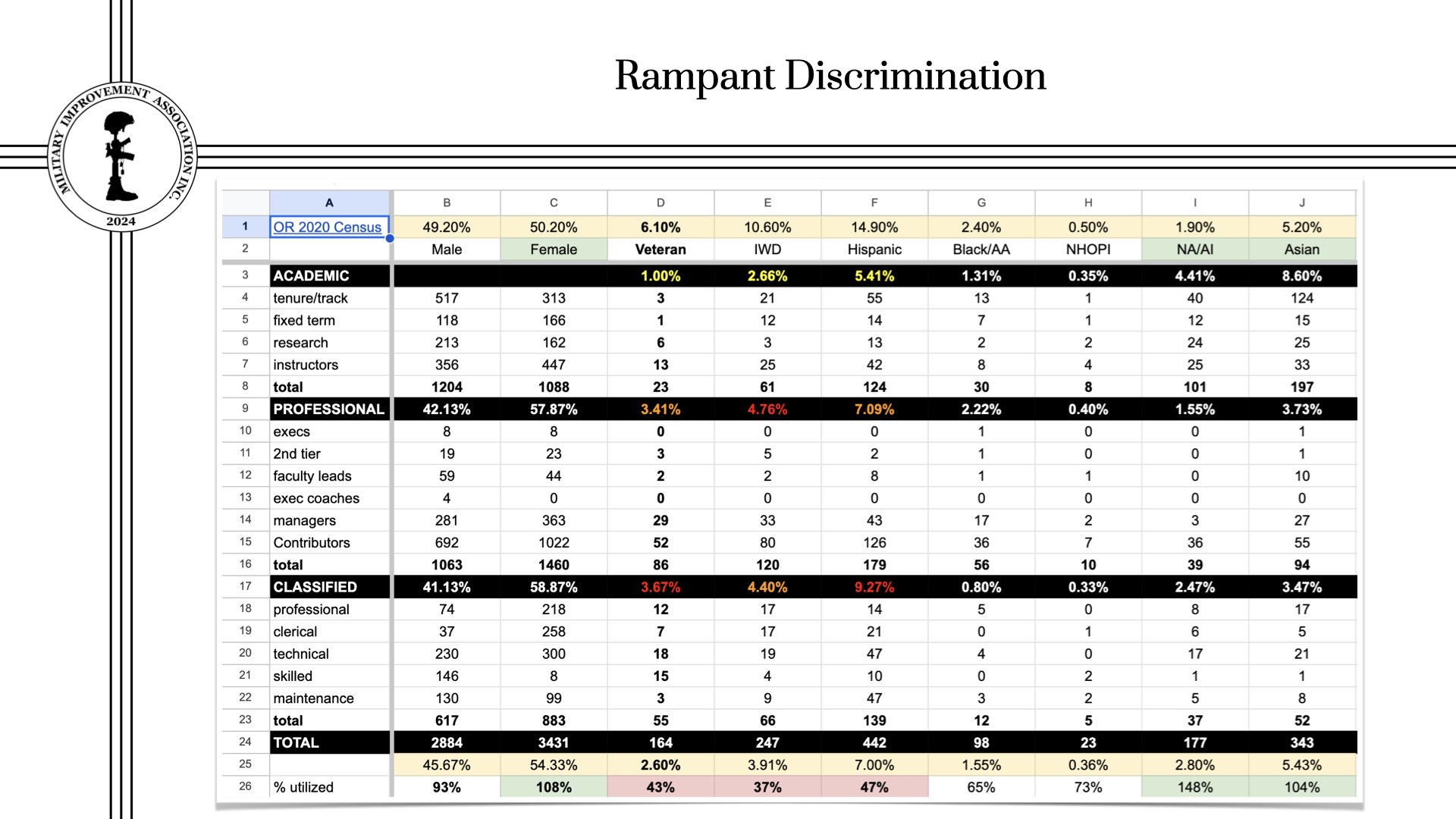
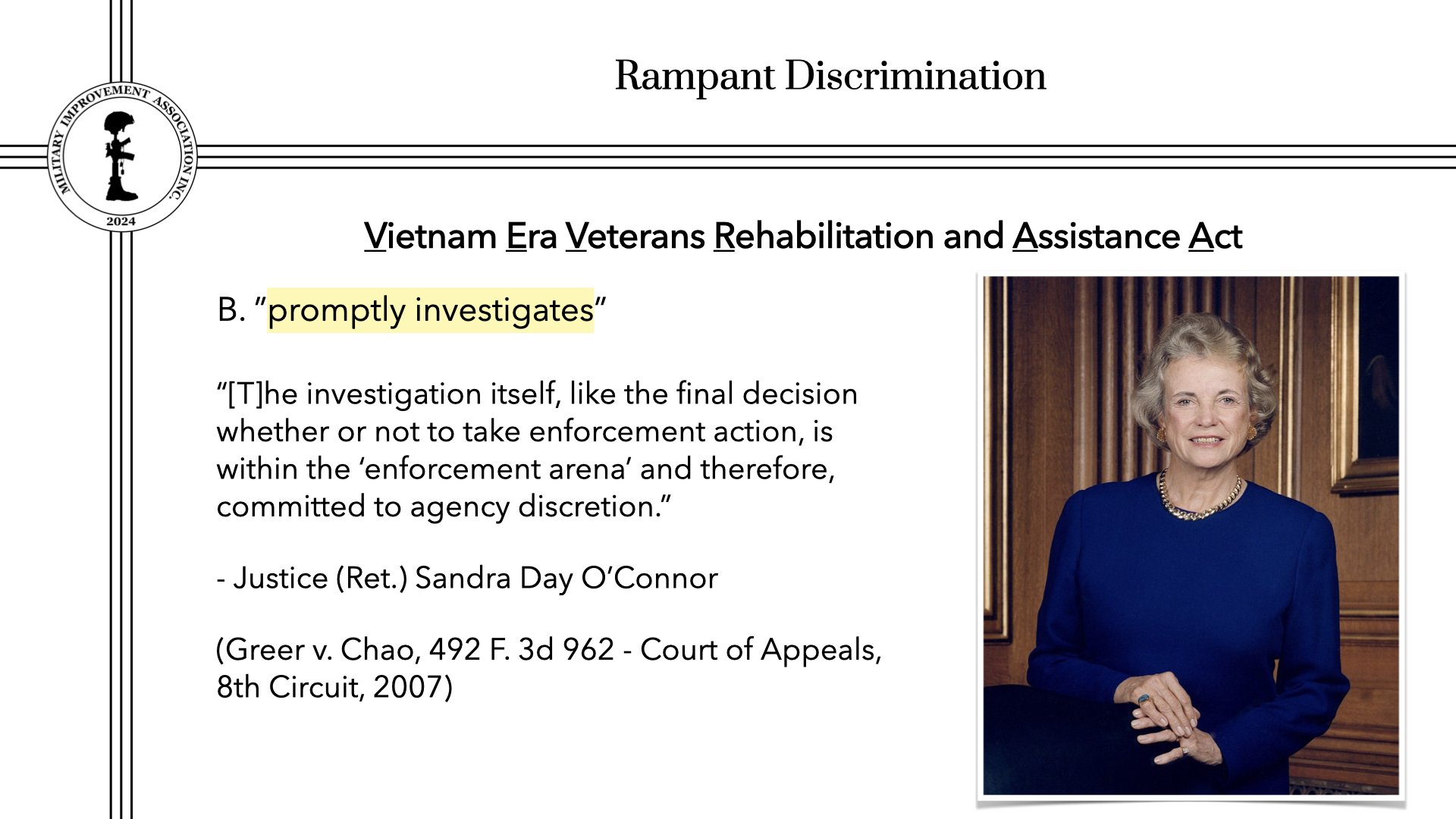
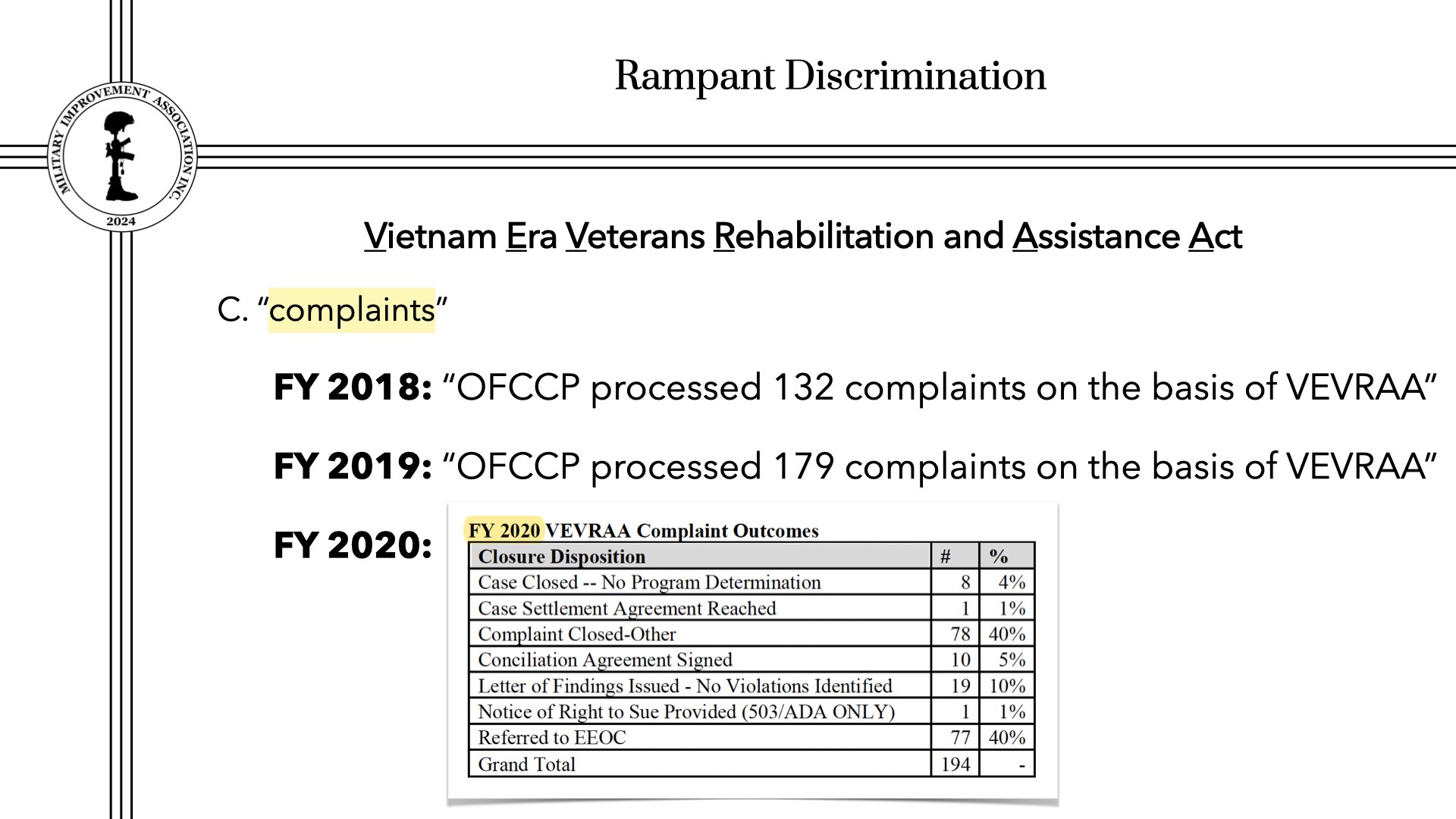
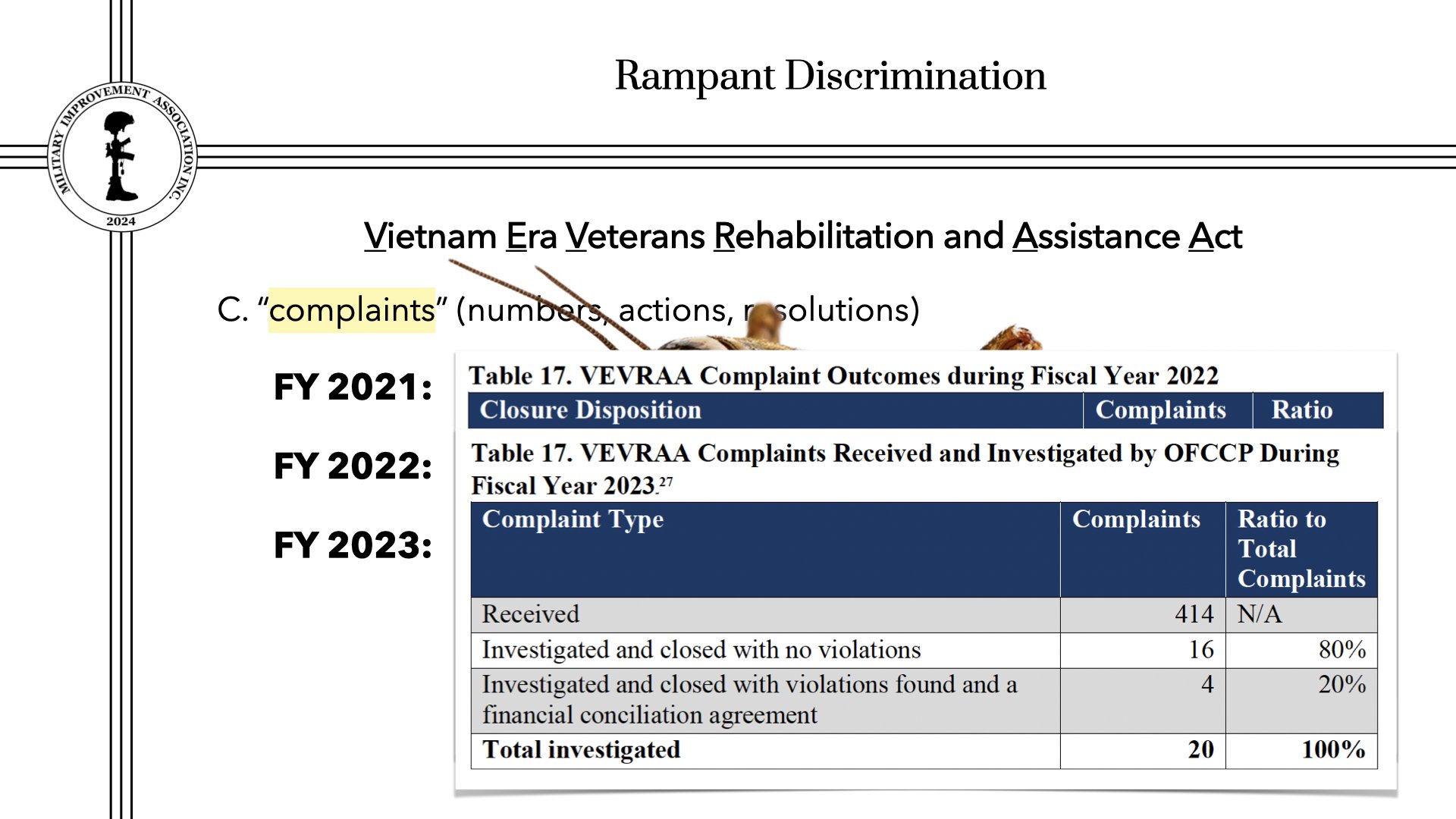
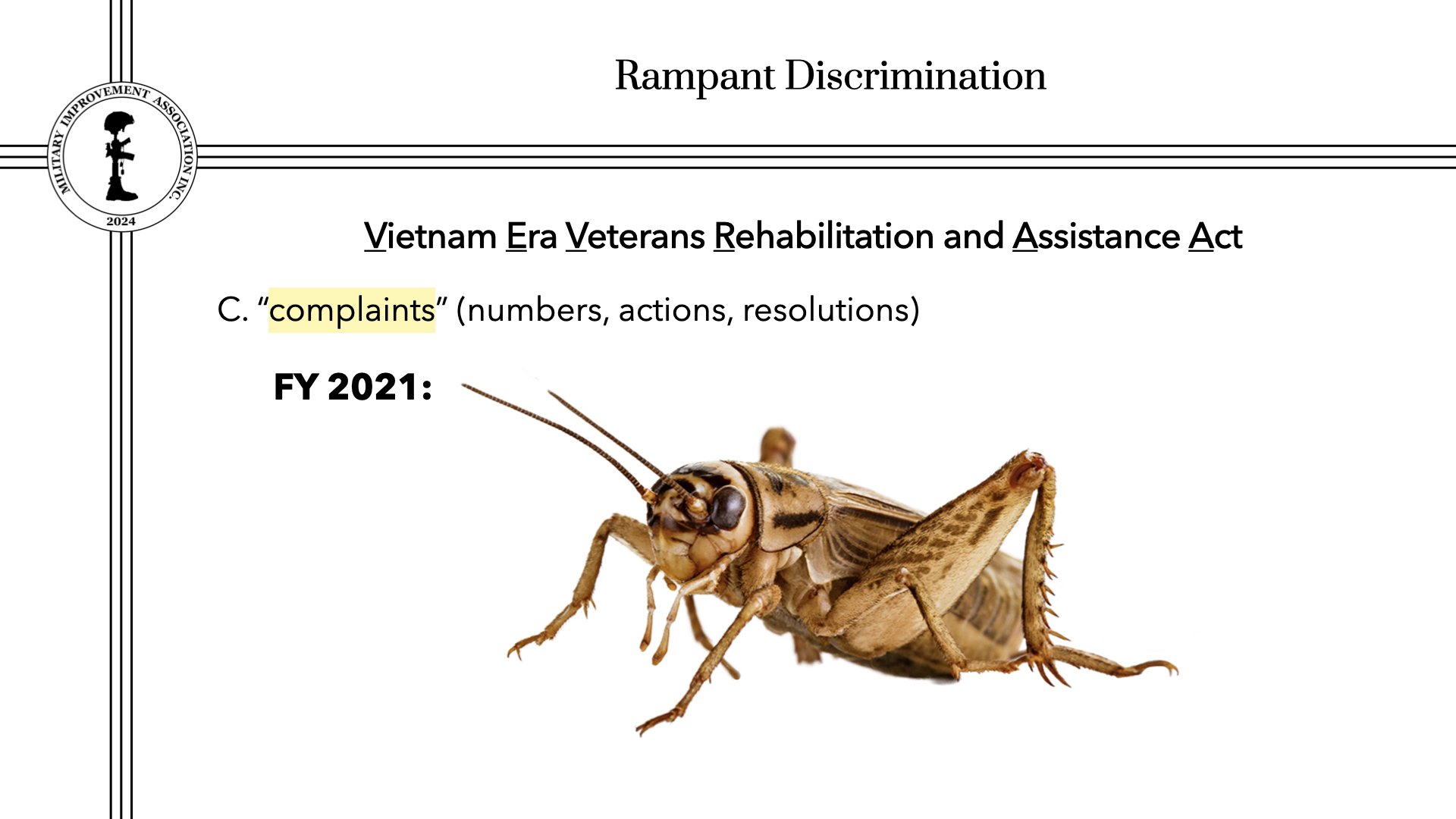
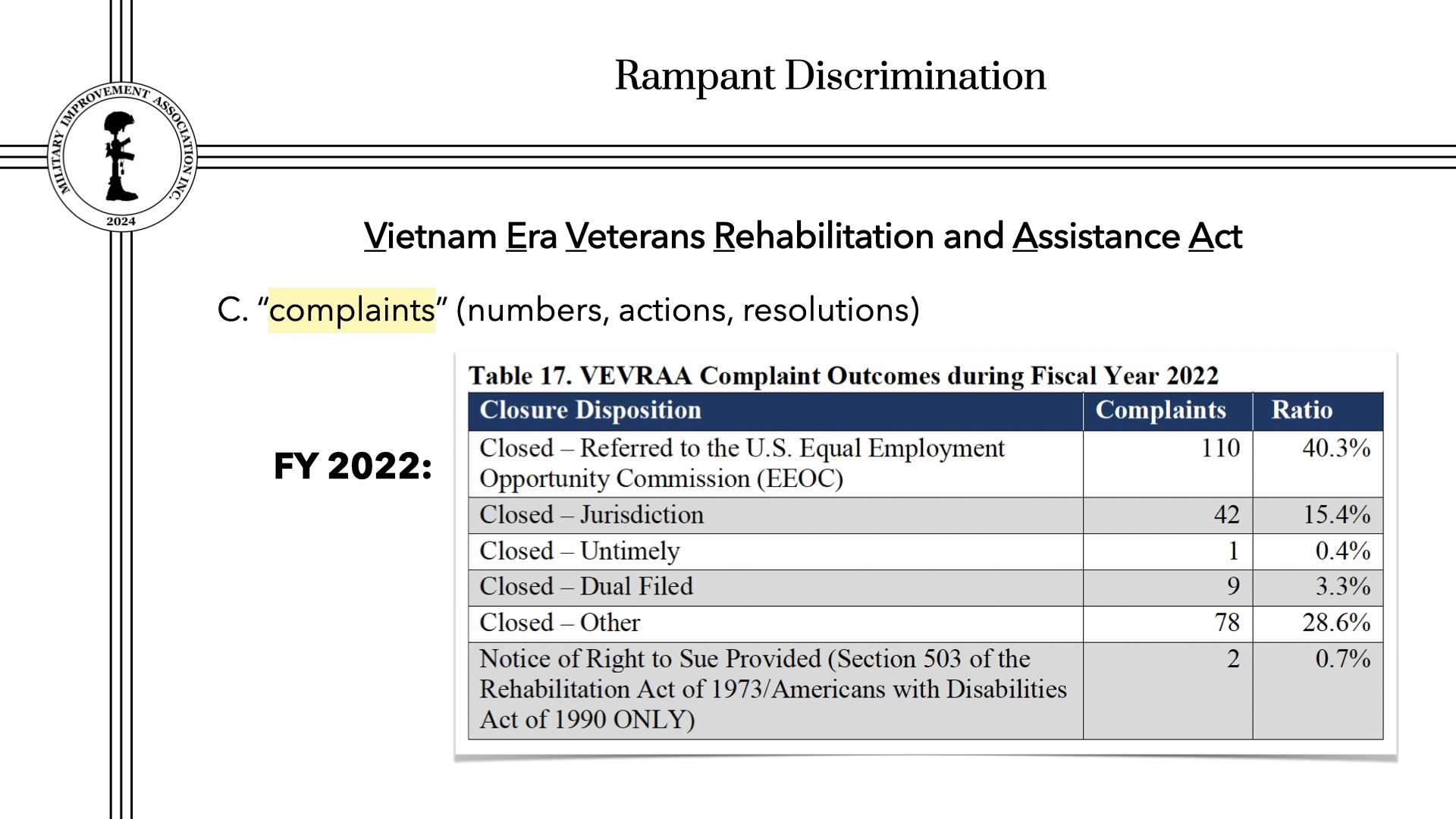
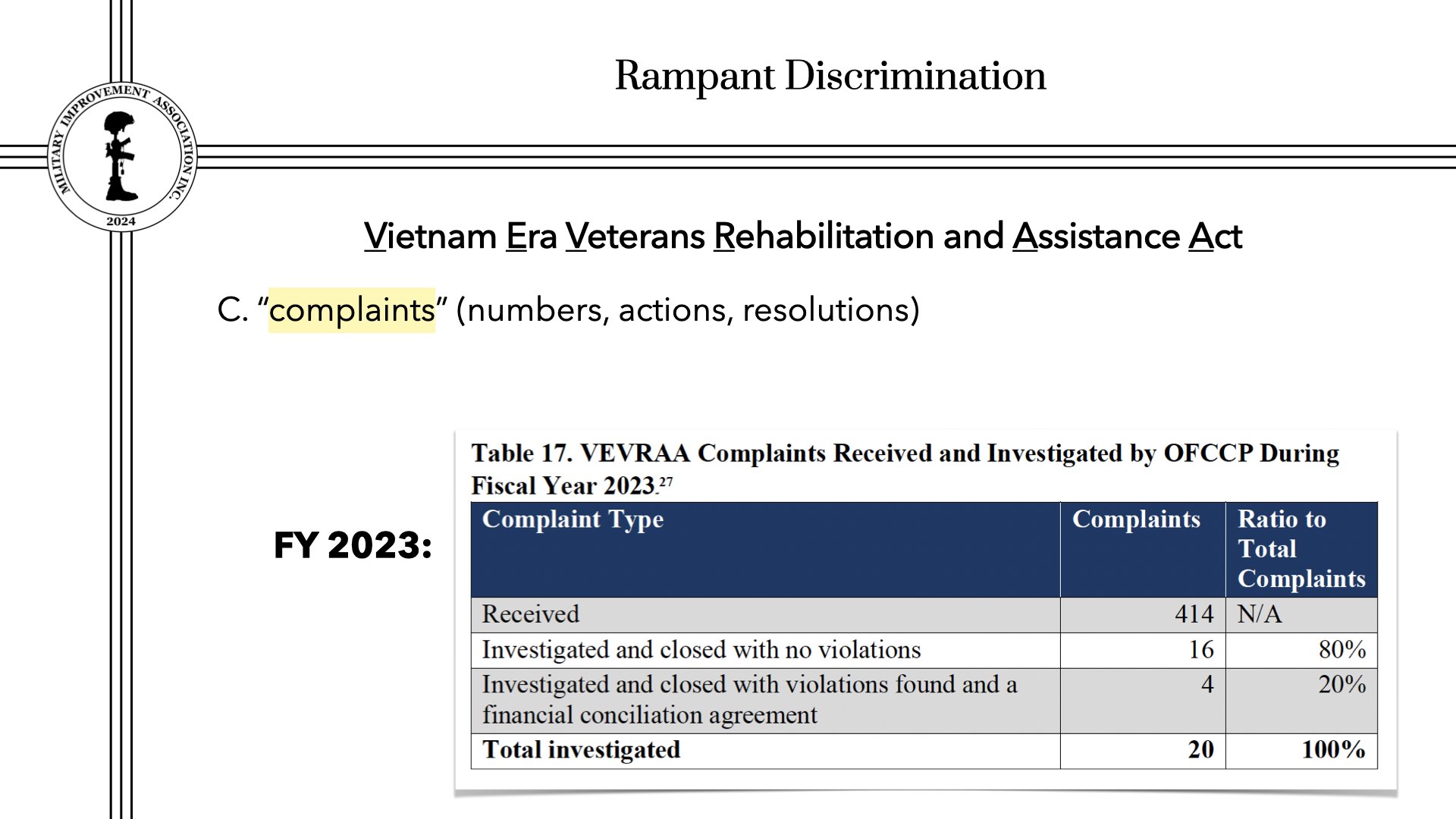
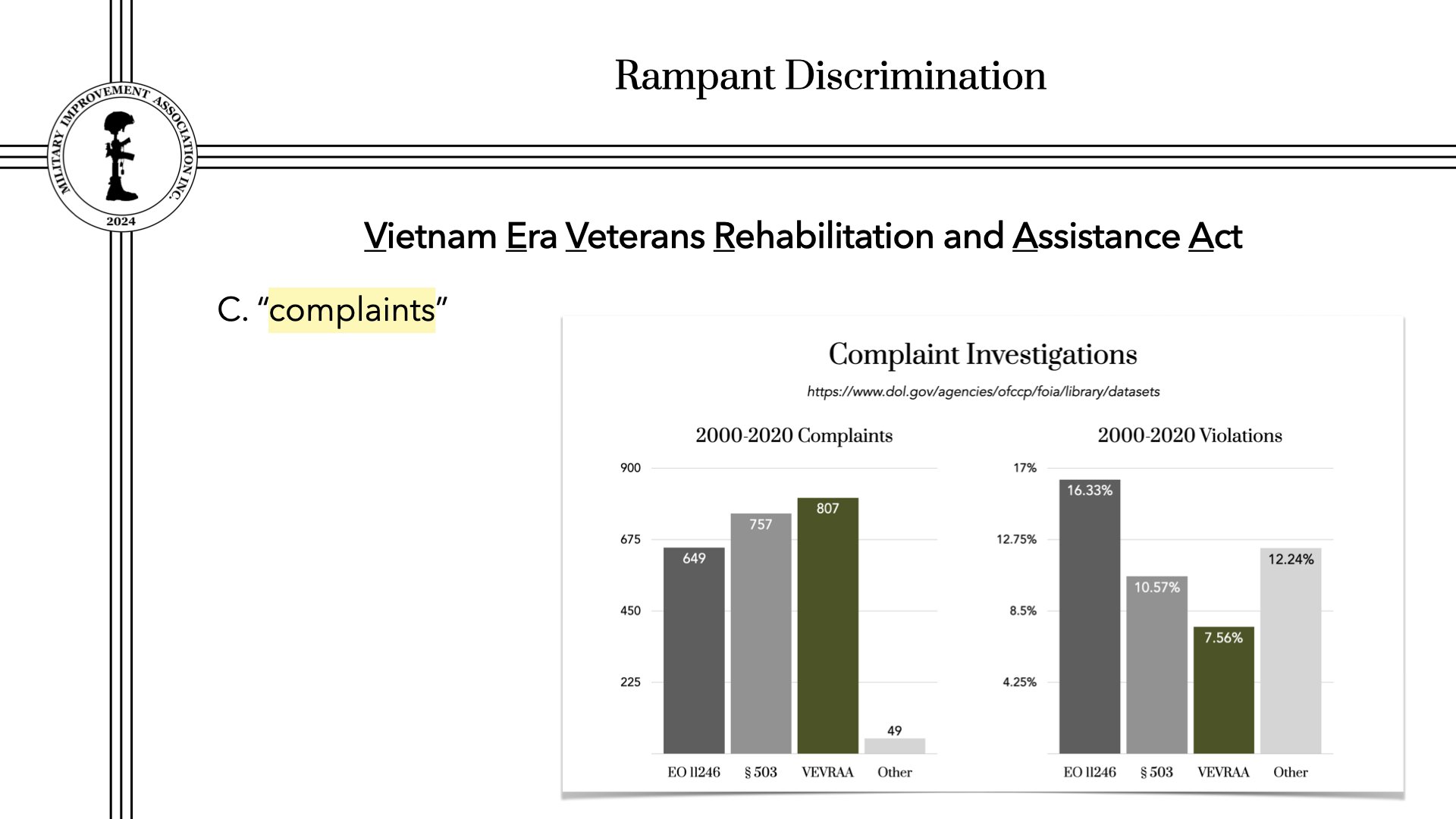
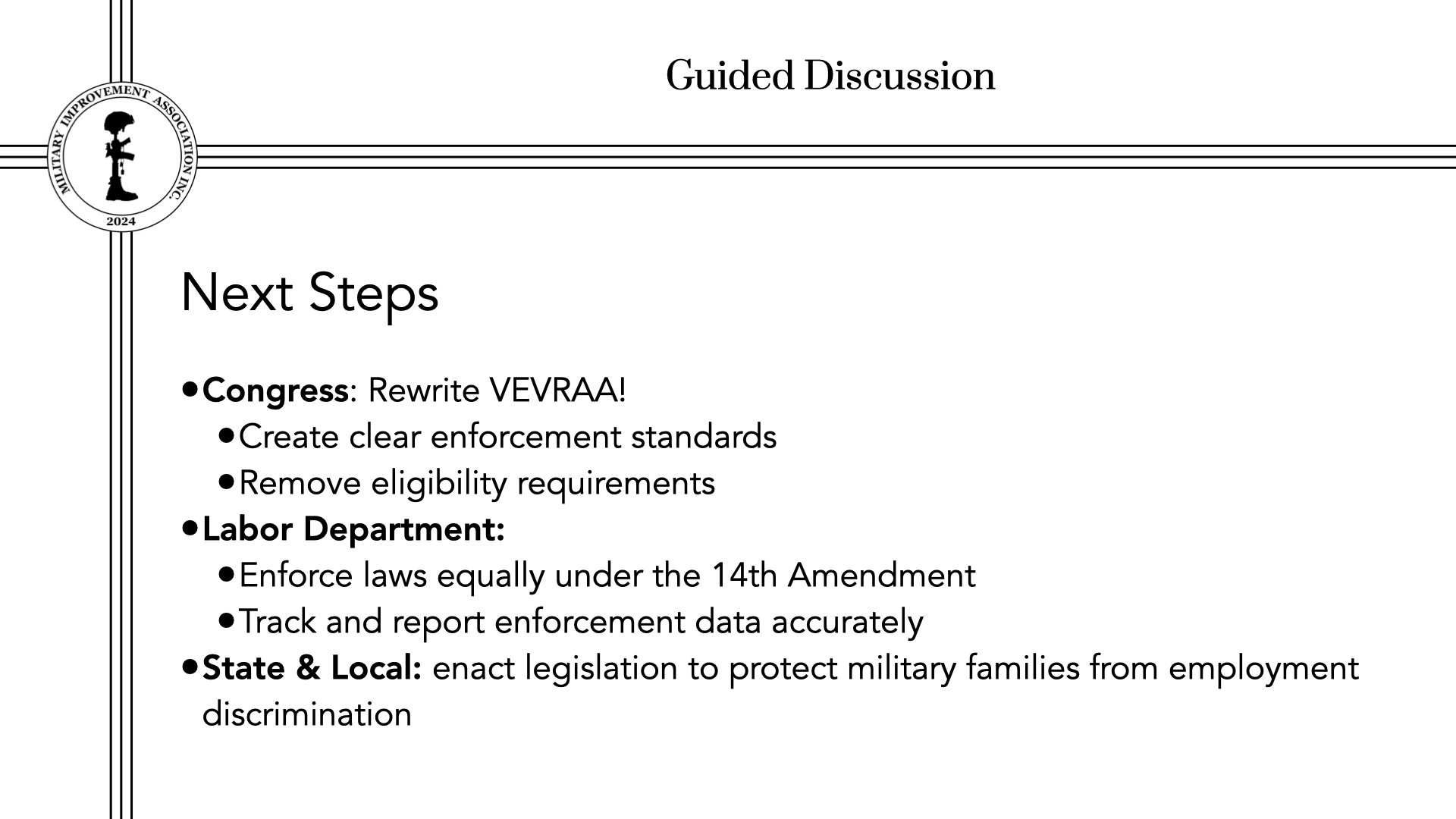
Discussion
AI Generated Transcript
um I'm just I would just say what so just so I understand what is your next step in uh giving
V I really don't know a poorly written law yeah because you'd have to get it amended first and then once it was amended then you'd have to write a new law which is a whole another you know I don't know if you could getting it amended I don't I don't know that I I just wonder what the next I I don't claim to I don't write policy so I don't really understand how that works but I just wonder what your next step would be and uh are there any other laws because a lot of times I'm sure you've read USC's and you know that there's a lot of things that cover you know is there anything that um can cover vavra like that maybe supports vavra that question is easier Ada is easier so as quickly as I can I had to essentially filed two complaints at Duke because there's some question as to whether or not so I I was on the cover of Christian Today magazine in June 2015 and the cover with my dumbass face on there uh said uh called me war torn and that was right before I was putting in my most recent PhD applications and I'm in every seminary in the US as poster boy for PTSD um did you want that or did they do that with your nope and they didn't get a signed release for my photo either but when I go to attorneys W like I can't find an attorney because and this is right back to your question to separate my disability say PTSD from uh my service like that's an impossible question like I I don't know what it would look like to that somebody's discriminating against me because I'm disabled or only because I'm a veteran or like I don't it's like sex and and color like did someone hate on you because you've got uh female genitalia or because your skin is not light enough like I don't know it's in their head um so I think and that's why you'll notice like hate crimes is much more actionable because the law is written in a in a different way we have protections they haven't been enforced but with VRA we don't have protections so at Le like in my mind I had been going for look have a a full Committee hearing on this because if Congress doesn't know they've been G being given information that I can't verify um but at least if it's a if it's if there's public awareness of it that seems to grease the the the the gears a little bit because I don't like yeah I think you have to rewrite the law because it's just so poorly worded it's all already been tested in the courts so until the Law changes any other court is going to have to follow the E circuits uh precedent yeah and the burden of proof is really the burden of proof is really high that's one of the issues that we run into the burden of proof is so high that it makes it hard to enforce um that's one of the issues you run into yeah and I didn't mention that I was actually you I don't know if you ever heard of diomi the school for EO down in Florida the Army school for equal opportunity I actually went to that school when I was when I was on active duty so I was in EO I was EO representative at the Brigade level um I did it for a little while then I went in and said hey I don't want to do this job no more because one I'm not it's gonna stop me from getting promoted because it's gonna give me a bad name and uh who I didn't think it was really doing what it said it was supposed to do so I asked to be sent back down to the line so I I know very I know very well how the EO system in the military works and how it can um yeah I know how the system works yeah yeah I mean there's a reason it's not it doesn't receive 50% popularity anymore it was a little con I I always thought of affirmative action as a a finite solution for an infinite problem because it doesn't address the roots of it it just wants to it's trying to create a way to expand diversity and one of the things in employment I thought well instead of like a stick what if you had a carrot what if you could reward employers of any size uh if they meet you know say six% threshold if you meet six% threshold you get some kind of tax break right what if you use a carrot instead of a stick and that way are going to have to learn I want dd214s who's got them give them to me and then it puts the power in the Veteran's hand to be like oh you better treat me right because I don't have to give you my DD214 um and I think that might be more effective um yeah it's it's a tougher nut to crack um and that's why I think hate crimes is more actionable it's visceral it's high contrast and it's enforceable it's just hasn't been enforced but this one's it's harder when it when it comes to I can tell you when it comes to gender and um race they are definitely something that um is still in force and it's something that that organizations um are still taking uh agencies are still taking de and I uh gender they're taking it very serious especially here in the Pacific Northwest uh it is something that is taken very serious the military aspect I and I don't I don't know if it's taken as serious you know some of the student vets at OSU have said pretty frankly to me like no it's a joke and it's it's not a toxic environment but it's also like they know they know there's yeah they know um I part of me also wondered if there's some like affirmative action is is facing an uphill battle but if the arguments or the arguers against affirmative action also like if there's a way to draw service and service members and their rights and human dignity into that discussion I wonder if it would make it more difficult to undermine Dei and affirmative action because I believe in I believe in the systems but I also think that like I said it's like it's a weird inverse way that it might just be simpler to incen use incentive incentives rather than enforcements um and if there's some way for service members advocacy to help support keeping affirmative action in Dei like I'm all for it um but a lot of the places that don't want to that don't want to treat us like human beings are the progressive spaces because they want to believe or they have some idea in their mind that we're either damaged goods or we can't be trusted with weapons or something I don't know um and so it's it's just a very unique situation that's going to take a lot more thinking and working than say like hate crimes yeah definitely yeah definitely I I agree Tim and Nick you got anything or thoughts questions
concerns well it's just it's it's one of these things it's it's hard to quantify um because it's a pervasive and it's a very low undercurrent um I do suicide prevention that's my thing and I talk about my PTSD my time in the military I sered from 84 to 87 I did not see combat but I was also involved in the largest single day loss of military life in the history of the United States military on December 12th 1985 in gander's Newland um people do they you're a veteran uh oh is you know are you are you you stable you just very low pervasive it's it's not you're not going to find someone with a big sign I hate veterans that doesn't happen but yeah you you you just you get like like Logan said we get used to oh I didn't get that I didn't get that promotion I didn't get that job I didn't get and you find out you know down the road here and there well you know that was you know they weren't going to do it anyway I was fortunate um I my last position was with the state of California governor's office of emergency services my section the California state warning center our manager was retired command sergeant major he looked for veterans because he knew we had this level of training and Duty sense of Duty and stuff and he can teach the job you can't teach those kind of skills that you we get in the military we I was very fortunate a lot of other places not so much you know and how do you prove it you know it's tough I me it is is really tough and and the laws you know as we've been pointed out they're there but they're they're hard to enforce and it it it some of it is is very ambiguous as to what it means you so so what do you do um it's tough you know but it's a conversation that needs to be had because this again you know from my my perspective in working with veterans veteran and first responder suicide is these are the things when you know the the reasons veterans commit suicide are it's not related to their combat experience it's things like finances it's the constant move it's there's all these things in there that come up that are the same they're just Amplified because of of us being uh having served in the military uh we it gets more Amplified U this but the statistics that we have from the VA are showing things you know family issues Financial issues well these are all the root of this if you can't get a job you can't get into school you can't get you know whatever is you're trying to do um you know what do you do you know where do you wind up at yeah can I um can I just go over real quick I'm sorry I didn't mean to cut you off uh Isaac I know we're short on time but you let me know if this I as a EO representative my job was to go in and uh not necessarily enforce um enforce the um uh affirmative action it didn't work the way there was a very bad PR on how affirmative action works and I think that getting the understanding that you're not trying to make someone hire somebody you're just going through and checking to make sure the hiring process is working correctly there's a big difference and what people understand is oh you're going to tell me I have to hire this person and getting them to understand no we're not telling you to hire anybody we just want to know how it's possible that out of this entire population you didn't pick one and we just want you to explain that the way the EO system worked in the Army and I was my job was was when the E7 board was published um you remember I don't know if you remember but there would be a certain amount of time between when the board was convened when and when they published it my job with the EO program was to go in and look at who was selected how many like how many females were selected how many minorities were selected we would go through and look at that and we would bump the numbers then we would bring the board back in and say how we're not saying that you have to change but how is it possible you didn't pick one black person you mean to tell me there was not one qualified black person out of the entire Army and they would just kind of look at us and say well we'll go back and redo it and we'd say okay so I don't know if you remember where it would be times when it would take forever for the E7 board to come out it was because we were making them go back and redo it and but we had to be able to bump those numbers we had to know how many were qualified how many were selected and uh sometimes we would have to release a board member where we they we would talk to the president of the board and we'd say we think star major such and such needs to go back to 82nd because he doesn't see that there's any women that are qualified and we would tell him you know send them back to 8 second thanks for his uh service but we don't need him uh so uh that's how the EO system actually worked in the m in the Army when it came to Promotions and I think getting that message across in the civilian world to employers that we are not here to make you hire a veteran we just want to look at the data and we want you to explain to us how there is not one person qualified and you have 50 uh that applied you have 50 that applied to work here and you didn't pick one and that's something to look at so yeah sorry I didn't mean to go over I know we're over two minutes sorry I just thought that was something I said honestly never talk about this seriously most people don't even know I did this job so I did that job most people in the military don't even know I did it but it was something that they would call us and uh as a e Brigade EO they would call us and say hey we want you to come to Fort Benjamin uh Harris in Indiana where the board convenes and they would ask us hey you know first start and I was starting first class at the time we want you to review the um the board results and give us your your ideas and would be about seven of us you know so yeah I share that with you yeah well thanks for sharing that um we are over time uh the next meeting I think I I looked at October 3D oopsies um I'll send out by email I'll try and pick a a topic I've covered the big ones hate crimes and employment are the big ones um if there's something that you have some interest in let me know September 23rd through 25th are the ledge days here in Oregon I'm going to be there um Eric if you can make it I'd love for you to be there as well um y I'm still waiting on some of the like man some of the Committees I've got my own personal legislators I'm on their calendar but um I want to be you at the state level try and see what we can do about being an example for the rest of the the nation um and then October 3rd we'll we'll meet after that but I appreciate everybody being on um thanks for giving me your time and attention I'll send this I'll get the two separated and on YouTube I'll send the link and follow up later yep thank you thanks guys
